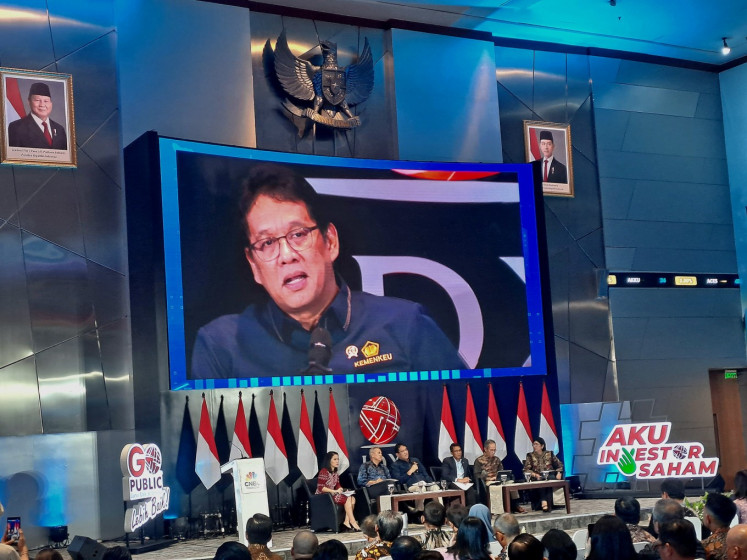Popular Reads
Top Results
Can't find what you're looking for?
View all search resultsPopular Reads
Top Results
Can't find what you're looking for?
View all search resultsResearch finds that spotlighting local areas generates better economic impact
According to statistics from the Cooperatives and Small and Medium Enterprises (SMEs), the MSMEs sector contributes Rp 8,547 trillion to Indonesia’s GDP.
Change text size
Gift Premium Articles
to Anyone
A
ccording to statistics from the Cooperatives and Small and Medium Enterprises (SMEs), the MSMEs sector contributes Rp 8,547 trillion to Indonesia’s GDP. Moreover, the number of MSMEs is rising per annum, with 4 percent growth in the number of entrepreneurs in Indonesia by 2024.
The rise in revenue and actors can be taken as a sign of economic growth and recovery. However, data show that digital economic activities mostly occur in major urban cities, making for an unbalanced growth throughout the country. So far, Jakarta as the capital and the most advanced city in Indonesia, makes up 17 percent of Indonesia’s GDP.
The collaborative effort to develop MSMEs is largely attributed to the rise of digitalization, which was further accelerated during the pandemic. In order to sustain their businesses, online e-commerce platforms have tried to put local brands and artists in the spotlight.
“All relevant parties must work together to ensure that MSMEs in Indonesia have the same opportunity to grow, develop and contribute to the economy. This is what motivated Tokopedia to introduce the Hyperlocal initiative back in 2020,” said Trian Nugroho, AVP of Regional Growth Expansion (RGX) at Tokopedia.
Tokopedia and the Institute for Development of Economics and Finance (INDEF) recently collaborated on research, entitled “Impact Analysis of Tokopedia's Hyperlocal Program on Online Sales Business, Economic and Social Conditions of Hyperlocal Program Cities,” which demonstrated the significant contribution of Tokopedia's Hyperlocal initiative to the digital economy in various regions throughout Indonesia.
Research shows that the Hyperlocal initiative can help in three ways; as it has the potential to drive sales and keep the economy growing for the surrounding regions, it can reduce the rate of unemployment and help eradicate poverty and lastly it can broaden seller and buyer penetration in cities to cut intercity shipping costs.
“In 2020-2021, the average sales in cities with Hyperlocal Tokopedia grew 147 percent over 2017 to 2019. Surabaya, Bandung and Yogyakarta are the three cities with Hyperlocal Tokopedia that have the highest sales index and turnover index,” noted Nailul Huda, INDEF researcher.
(/)Research shows that the Hyperlocal initiative benefited the cities as the average sales index rose five times greater than cities without the program between the 2017 and 2021. Meanwhile, turnover in cities with the Hyperlocal initiative surged by 67 percent in the 2020 to 2021 period compared with the 2017 to 2019 period.
For instance, Surabaya’s sales index and turnover index saw increases of 194 percent and 85 percent, respectively; while Bandung's increased by 27 percent and 100 percent; and Yogyakarta's increased by 148 percent and 64 percent, respectively.
Huda further explained that the research also recorded an increase in economic growth in cities with Hyperlocal initiatives from Tokopedia. The aforementioned cities are also the three areas with the highest increase in economic growth from 2020 to 2021, amounting to 2.78 percent. By contrast, the cities without the initiative had economic growth of 1.26 percent.
“Following the launch of Tokopedia’s Hyperlocal initiative, unemployment dropped from levels seen during COVID-19 by -0.67 points. Statistically, Tokopedia's Hyperlocal initiative is capable of curbing unemployment,” elaborated Huda. He further said that the cities with the highest rates of poverty reduction are Surabaya, Semarang and Medan.
Lastly, the Hyperlocal program has the ability to reduce the unequal economic growth between cities across the archipelago. Rather than relying on goods from other cities, they can now rely on suppliers near their area, cutting the cost of intercity shipments and reducing their carbon footprint.
“By leveraging geo-tagging technology, the initiative has broadened the scope of seller transactions, making it easier for people to find the nearest store. This allows for more efficient transactions due to lower shipping costs, as well as increased exposure for local MSMEs with high sales potential,” Trian added.
When comparing 2017 to 2019 data with 2020 to 2021 data, research shows that the cities with the highest increase in the number of sellers are Surabaya, Bandung and Yogyakarta. Moreover, Bandung, Yogyakarta and Surabaya recorded the largest increase in terms of buyers with all three exceeding 100 percent.












